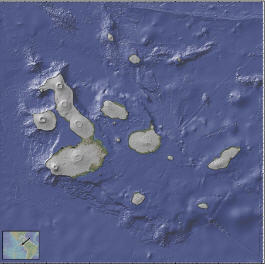How Have Changing Sea-Levels Influenced Evolution on the Galapagos Islands?

Writing in the Journal of Biogeography, Jason Ali and Jonathan Aitchison explore how fluctuating sea level changes over thousands of years impacted the island chain’s ecology.
They estimate that when the sea retreated, most recently 20,000 years ago, the water would have been 144m below its current level.
As a result, Santa Cruz, the island in the center of the archipelago, would have expanded, enveloping many of the smaller islands, while creating a series of shallow ‘land bridges’ between the volcanic outcroppings.
Such bridges explain the range and diversity of the islands' species, such as snakes, geckos and iguanas, which appear landlocked to modern eyes.
“As soon as I saw that that half the islands in the archipelago were sat on a single, shallow, submarine platform, I realized that the implications for biology could be significant,” said Dr. Ali.
“My geological knowledge told me that sea-level falls must have regularly re-connected the islands, and that this must have profoundly shaped the landlocked biota’s distribution, and very likely its composition.”
Media Contact
More Information:
http://eu.wiley.com/WileyCDA/PressRelease/pressReleaseId-110742.htmlAll latest news from the category: Earth Sciences
Earth Sciences (also referred to as Geosciences), which deals with basic issues surrounding our planet, plays a vital role in the area of energy and raw materials supply.
Earth Sciences comprises subjects such as geology, geography, geological informatics, paleontology, mineralogy, petrography, crystallography, geophysics, geodesy, glaciology, cartography, photogrammetry, meteorology and seismology, early-warning systems, earthquake research and polar research.
Newest articles

Recovering phosphorus from sewage sludge ash
Chemical and heat treatment of sewage sludge can recover phosphorus in a process that could help address the problem of diminishing supplies of phosphorus ores. Valuable supplies of phosphorus could…

Efficient, sustainable and cost-effective hybrid energy storage system for modern power grids
EU project HyFlow: Over three years of research, the consortium of the EU project HyFlow has successfully developed a highly efficient, sustainable, and cost-effective hybrid energy storage system (HESS) that…

After 25 years, researchers uncover genetic cause of rare neurological disease
Some families call it a trial of faith. Others just call it a curse. The progressive neurological disease known as spinocerebellar ataxia 4 (SCA4) is a rare condition, but its…





















